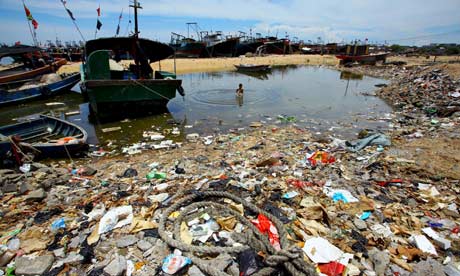Nations urged to combine environmental and development goals
World leaders should set six new sustainable development goals to achieve global prosperity, scientists argue

'Humans are
transforming the planet in ways that could undermine any development
gains,' the paper warns. Photograph: AFP/Getty Images
World leaders should set six goals around universal clean energy, an end to water and food shortages, thriving lives and livelihoods, and healthy and productive ecosystems, they say.
Prof David Griggs, director of the Monash Sustainability Institute in Australia, argues in an article in the journal Nature that it is no longer enough for countries to solely pursue the poverty alleviation targets enshrined in the millennium development goals (MDG) that were agreed in 2000 but run out in 2015.
"Humans
are transforming the planet in ways that could undermine any
development gains. Mounting research shows that the stable functioning
of Earth systems – including the atmosphere, oceans, forests, waterways,
biodiversity and biogeochemical cycles – is a prerequisite for a thriving global society," he writes, with colleagues.
Instead,
the authors say that the old goals should be combined with global
environmental targets drawn from science and from existing international
agreements to create new "sustainable development goals" (SDGs).
"Pursuing
a post-2015 agenda [which is] focused only on poverty alleviation could
undermine the agenda's purpose. Growing evidence and real-world changes
convincingly show that humanity is driving global environmental change
and has pushed us into a new geological epoch. Further human pressure
risks causing widespread, abrupt and possibly irreversible changes to
basic Earth-system processes. Water shortages, extreme weather,
deteriorating conditions for food production, ecosystem loss, ocean
acidification and sea-level rise are real dangers that could threaten
development and trigger humanitarian crises across the globe," say the
authors.
Countries began the political process of adopting new
post-2015 targets earlier this month at the inaugural meeting of the
open working group on sustainable development
goals at the UN headquarters in New York. Most developing countries
argued, as they have done throughout the long-running UN climate
negotiations, that rich countries should do more than developing
countries to alleviate environmental pressures on the basis that they
have been largely responsible for the problems and have greater
resources to tackle them. However, developed countries want to see
ecological improvements included as an overarching priority in the
future goals of developing nations.The scientists' hopes rests on countries combining existing, agreed UN targets and adopting a new definition of sustainable development. It is presently defined as: "Development that meets the needs of the present without compromising the ability of future generations to meet their own needs." They propose: "Development that meets the needs of the present while safeguarding Earth's life-support system, on which the welfare of current and future generations depends."
"None of this is possible without changes to the economic playing field. National policies should, like carbon pricing, place a value on natural capital and a cost on unsustainable actions. International governance of the global commons should be strengthened, for example through binding agreements on climate change, by halting the loss of biodiversity and ecosystem services and by addressing other sustainability concerns," says the article in Nature.
"A small number of goals is essential for focus; others could be added but should build on the core six. But the first step is for policymakers to embrace a unified environmental and social framework for the SDGs, so that today's advances in development are not lost as our planet ceases to function for the benefit of a global population."
No comments:
Post a Comment